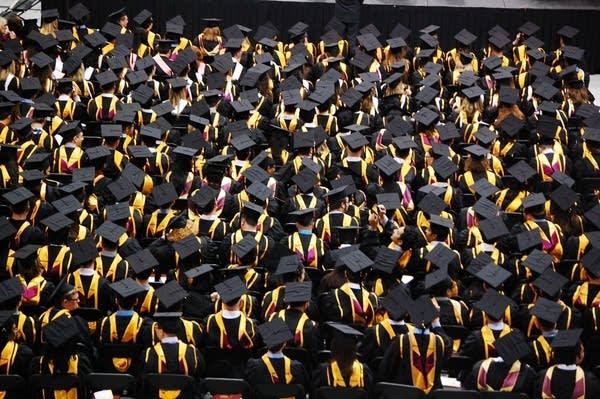Canada tempts MN college students with tuition reciprocity
Go Deeper.
Create an account or log in to save stories.
Like this?
Thanks for liking this story! We have added it to a list of your favorite stories.

It's the time of year when many Minnesota high school students are figuring out their college plans.
A couple of schools they may not have considered are the U of M and the U of W — no, not the University of Minnesota or the University of Wisconsin, but the University of Manitoba and the University of Winnipeg.
Minnesota has had a tuition reciprocity agreement with Manitoba, Canada for more than 20 years, but not many people know about it. Under the agreement, students from Minnesota can attend several well-regarded Canadian universities as an international student, but only a day's drive away from home.
Manitoba officials are trying to bring exposure the opportunity, and with the promise of inexpensive tuition hope to lure north cost-conscious Minnesota students. Tuition is Manitoba's biggest selling point — a year of tuition at a Manitoban university runs between $3,500 and $4,000. Students from Minnesota can use U.S. federal student loans to pay for tuition at most Manitoba colleges. However students are not allowed to use federal Pell Grant money.
Turn Up Your Support
MPR News helps you turn down the noise and build shared understanding. Turn up your support for this public resource and keep trusted journalism accessible to all.
Jillayne Bohlen, 18, of St. Joseph, Minn., is a first-year student at the University of Manitoba in Winnipeg.
She picked the Canadian research university for its global economics program, but admits she was also looking for something a bit unique in her college experience.
"It's obviously a different country but it's only about six hours from my house. It's still a different experience without being too far from home," Bohlen said.
Despite being an international student she pays the same tuition rate as Manitoba residents, thanks to the reciprocity agreement with Minnesota.
"I pay $3,800 for tuition. Which is super cheap compared to back home," Bohlen said.
That's about $1,000 less than a year's tuition at a Minnesota community college, a few thousand dollars less than a year at a state-run university, and $8,000 less than in-state tuition at the University of Minnesota.
Low-priced tuition is a main selling point when trying to attract students from Minnesota, said Jeff Adams, who is in charge of recruitment at the University of Manitoba.
"It's a huge savings and compared to colleges in the United States it's extremely affordable," he said.
Manitoba officials say healthy government funding for higher education, and a recently expired tuition freeze, have kept tuition prices in check for nearly a decade.
Beyond the sticker price, Canadian higher education officials are also trying to sell Minnesota students on the international experience of attending school in Canada.
Darcy Rollins, who oversees international education outreach in Manitoba, notes that Canada is a bilingual country — English and French — and is right next door.
"It's a bit of the international study experience with the safety net of being fairly close to home," Rollins said.
According to Minnesota's Office of Higher Education, fewer than 50 Minnesota students currently attend colleges in Manitoba. About the same number of students from the Canadian province study in Minnesota. They're stepping up efforts to attract more international students, Rollins said.
"The more the merrier. We have institutions that want to recruit as many students as possible and expand the number of faces on campus," Rollins said. "To bring in some American cousins is only an added benefit of that."
Don't expect billboards advertising Manitoba colleges to spring up in Minnesota any time soon. Instead the provincial government has been reaching out to high school counselors in the state's schools.
One of them is Brooke Magid Hart, a counselor from Spring Lake Park High School. She recently took a bus trip to Manitoba, paid for by the provincial government, to check out the seven colleges that are a part of the reciprocity deal.
It was the first time she had heard of the opportunity.
"I always talk to students about reciprocity between Wisconsin, North Dakota, South Dakota and Minnesota and now I'll add Manitoba to that," she said.
Manitoba officials also offer another incentive to Minnesota students considering college in their province: $25,000 in tax breaks to help pay off school debt. Students would be required to stay and work in Manitoba for a time after they graduate.
Correction: An earlier version of this story mistakenly stated that Minnesota students can use federal Pell Grants at colleges that take part in the reciprocity agreement. While Minnesota students are allowed to use federal student loan money in Manitoba, they are not allowed to use Pell Grants.




